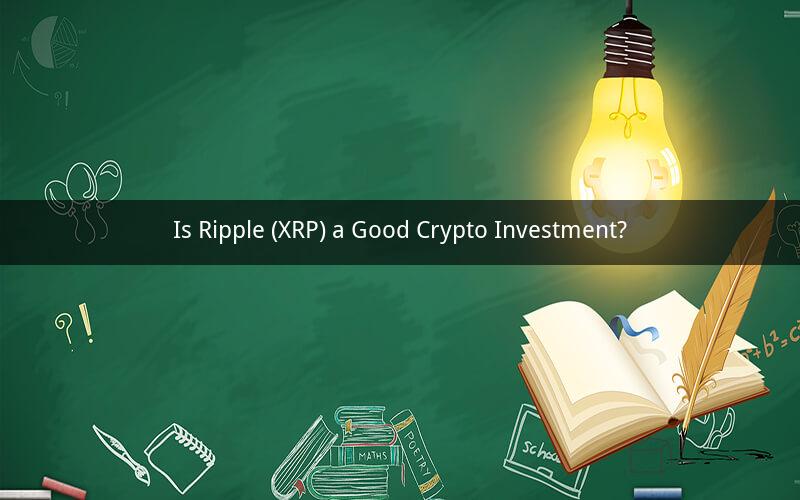
Introduction
In the ever-evolving world of cryptocurrencies, Ripple (XRP) has been a topic of much debate among investors. With its unique features and partnerships, it has garnered attention as a potential investment. This article aims to explore the factors that make Ripple a good crypto investment and delve into its advantages, risks, and future prospects.
Advantages of Ripple (XRP)
1. Faster Transactions
Ripple's primary advantage lies in its ability to facilitate faster and cheaper cross-border transactions compared to traditional banking systems. XRP can process up to 1,500 transactions per second, which is significantly faster than Bitcoin's 7 transactions per second and Ethereum's 15 transactions per second.
2. Strong Partnerships
Ripple has formed partnerships with various financial institutions, including banks, payment processors, and tech giants. These collaborations have helped XRP gain credibility and a strong position in the market. Notable partnerships include Santander, American Express, and MoneyGram.
3. Scalability
Ripple's network is highly scalable, allowing it to handle a massive volume of transactions without compromising on speed and security. This scalability makes XRP a viable solution for enterprises and financial institutions seeking a scalable blockchain solution.
4. Green and Sustainable
Compared to Bitcoin, which requires a significant amount of energy for mining, Ripple's consensus protocol is energy-efficient and eco-friendly. This has made XRP a more sustainable option for the environment.
Risks and Challenges of Ripple (XRP)
1. Regulatory Concerns
Like many cryptocurrencies, XRP faces regulatory challenges. The U.S. Securities and Exchange Commission (SEC) has filed a lawsuit against Ripple Labs, Inc., claiming that XRP is a security. This regulatory uncertainty can impact the future of XRP and its adoption.
2. Market Competition
The cryptocurrency market is highly competitive, with numerous altcoins vying for attention and market share. XRP must constantly innovate and differentiate itself from its competitors to maintain its position in the market.
3. Volatility
Cryptocurrencies, including XRP, are known for their high volatility. This can lead to significant price fluctuations, both in the short and long term, which can be risky for investors.
Future Prospects of Ripple (XRP)
1. Increased Adoption
As Ripple continues to forge partnerships with financial institutions and enterprises, the adoption of XRP is expected to rise. This increased adoption could drive the demand for XRP and potentially lead to higher prices.
2. Regulatory Clarity
Resolving the regulatory concerns surrounding XRP could significantly impact its future. A favorable ruling from the SEC or other regulatory bodies could pave the way for XRP's widespread adoption.
3. Technological Advancements
Ripple is continuously working on improving its technology and addressing the challenges faced by the network. Future advancements in its consensus protocol, scalability, and security could further enhance XRP's value and adoption.
5 Questions and Answers
1. Q: How does Ripple's transaction speed compare to traditional banking systems?
A: Ripple can process up to 1,500 transactions per second, which is significantly faster than traditional banking systems, which can take days to complete cross-border transactions.
2. Q: What is Ripple's primary use case?
A: Ripple's primary use case is to facilitate faster and cheaper cross-border transactions for financial institutions and enterprises.
3. Q: How does Ripple's consensus protocol differ from Bitcoin's?
A: Ripple's consensus protocol is more energy-efficient and eco-friendly, as it doesn't require mining, which consumes a significant amount of energy and contributes to environmental concerns.
4. Q: What are the potential risks of investing in Ripple (XRP)?
A: The potential risks include regulatory uncertainty, market competition, and cryptocurrency volatility. It's essential to conduct thorough research before investing in XRP.
5. Q: How can investors stay updated on Ripple's developments and partnerships?
A: Investors can stay updated on Ripple's developments and partnerships by following Ripple's official website, social media channels, and attending Ripple events and conferences.
Conclusion
Ripple (XRP) offers several advantages as a crypto investment, including faster transactions, strong partnerships, scalability, and sustainability. However, it also faces risks and challenges, such as regulatory concerns and market competition. As the cryptocurrency market continues to evolve, it's essential for investors to stay informed and make informed decisions based on thorough research.